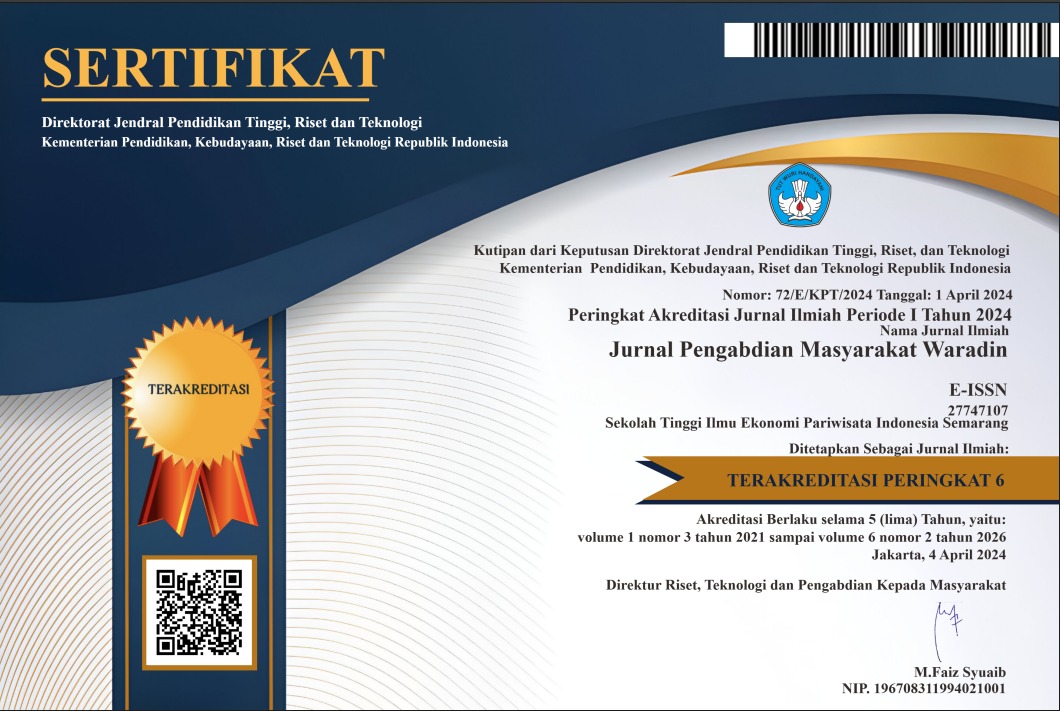Penguatan Ketahanan Ekonomi Berbasis Potensi Lokal : Budidaya Jamur Tiram di Desa Gunung Hejo, Purwakarta
DOI:
https://doi.org/10.56910/wrd.v5i2.746Keywords:
community service, local potential, oyster mushroom cultivation, economic resilience, sustainabilityAbstract
The goal of this community service program is to increase the economic resilience of the Gunung Hejo Village community through the development of oyster mushroom cultivation, utilizing local potential sustainably. This activity is designed to reduce the community's dependence on traditional agriculture, which is vulnerable to market price fluctuations, climate uncertainty, and limited business diversification. Oyster mushroom cultivation was chosen as an alternative due to its broad market prospects, relatively simple production process, and the ability to produce high yields quickly.The method used in this program is participatory, educational, and applicable, with students and the community actively involved in every stage of the activity, from planning and outreach, technical training, to hands-on practice in making mushroom bags and maintaining oyster mushrooms. Intensive mentoring is provided to ensure the community not only understands the theory but also develops practical skills that can be applied independently. The results of this activity indicate that the community has successfully improved their understanding and technical skills related to oyster mushroom cultivation, including raw material selection, planting medium preparation, maintenance, and simple marketing strategies. Each baglog produced provides a sufficient yield for both household consumption and sale as a supplementary commodity, thus directly impacting local economic income. The implications of this program lie not only in the economic aspect but also in the development of an environmentally friendly and sustainable agricultural business model that can be replicated in other villages with similar potential. Furthermore, this activity strengthens collaboration between academics and the community as a crucial foundation for building business independence and sustainability. Thus, this community service program makes a tangible contribution to rural economic empowerment based on local potential.
References
Bandara, A. R., Lian, C. K., Xu, J.-c., Mortimer, P., & East. (2021). Mushroom as a means of sustainable rural development in the Chin State, Myanmar. CAS. https://doi.org/10.48130/CAS-2021-0004
Chand, S., & Singh, B. (2022). Mushroom cultivation for increasing income and sustainable development of small and marginal farmers. Asian Journal of Agricultural and Horticultural Research. https://doi.org/10.9734/ajahr/2022/v9i430148
Fahrurrozi, H., & Wibowo, A. (2024). Empowering rural economies through sustainable oyster mushroom cultivation: A community-based approach in Bambang Village. Salwatuna: Jurnal Pengabdian Masyarakat. https://doi.org/10.59106/salwatuna.v4i3.211
Fisher, W. (2020). The rural non-farm sector in India. In Rural Economic Development and the Role of the Non-Farm Sector (pp. 208-234). https://doi.org/10.4324/9781315026534-17
Fitriawan, H., Cahyo, K. A. D., Purwiyanti, S., & Alam, S. (2020). Pengendalian suhu dan kelembaban pada budidaya jamur tiram berbasis IoT. Jurnal Teknologi dan Elektronika Pertanian, 9(1), 28-37. https://doi.org/10.23960/JTEP-L.V9I1.28-37
Handayani, R. S., Ismadi, K., Aryani, D. S., Wirda, Z., & Usnawiyah. (2022). Women empowerment through mushroom cultivation and processing in Aceh Utara. Global Science Society: Jurnal Ilmiah Pengabdian Kepada Masyarakat. https://doi.org/10.33059/gss.v4i1.4512
Ilyinskaya, E. V. (2021). Rural spatial development of Russia under conditions of socio-economic instability. Scientific Review Theory and Practice. https://doi.org/10.35679/2226-0226-2021-11-8-2599-2608
E. Jumiati, S. Chadijah. (2024) Pemberdayaan Ekonomi Berkelanjutan Perempuan Desa Gardu Melalui Sekolah Keterampilan Dan Literasi Untuk Mendukung Kemandirian Sosial-Ekonomi Di Desa Gardu, Purwakarta. Jurnal Pengabdian Bukit Pengharapan.
Kandpal, N., & Mishra, S. (2024). Cultivation of white button mushroom (Agaricus bisporus) for economic empowerment of hill people in Uttarakhand. Mushroom Research, 33(1). https://doi.org/10.36036/mr.33.1.2024.136141
Kedia, S. (2023). Economic development in rural India: Challenges and opportunities. International Journal of Science and Research (IJSR). https://doi.org/10.21275/sr231124185555
Kolb, D. A. (2014). Experiential learning: Experience as the source of learning and development (2nd ed.). Pearson Education.
Nadzirah, R., Savitri, D. A., & Novijanto, N. (2022). Oyster mushroom cultivation training as empowerment program for students of Foundation of Islamic Education and Social “Ar-Rohmah”. Warta Pengabdian. https://doi.org/10.19184/wrtp.v16i2.24621
Pavlik, M., Dzurenko, M., Kiiza, A., Akanyijuka, J., & Byandusya, P. (2023). Environmental, economic, and social benefits of cultivating the oyster mushroom Pleurotus ostreatus in a community organization in Southwest Uganda. SGEM International Multidisciplinary Scientific GeoConference EXPO Proceedings. https://doi.org/10.5593/sgem2023/5.1/s21.47
Pratiwi, F. A., Taskirawati, I., & Baharuddin. (2020). The bamboo sawdust and addition of EM4 as an alternative material for the cultivation of oyster mushroom (Pleurotus ostreatus). IOP Conference Series: Earth and Environmental Science, 575(1), 012140. https://doi.org/10.1088/1755-1315/575/1/012140
Rohmah, M., & Sholikhah, M. (2025). Community economic empowerment through oyster mushroom cultivation: A case study on agricultural-based empowerment using local raw materials. Kemakmuran Hijau: Jurnal Ekonomi Pembangunan. https://doi.org/10.61511/jekop.v2i1.2025.1332
Saputra, E. A., et al, 2024). Application of temperature and humidity control technology in the oyster mushroom cultivation business. Journal of Innovation and Community Engagement, 5(3). https://doi.org/10.28932/ice.v5i3.7673
Sarangi, D., & Acharya, S. (2024). Empowering rural youth in Puri district through mushroom cultivation for sustainable livelihoods. Journal of Krishi Vigyan. https://doi.org/10.5958/2349-4433.2024.00012.6
Sedana, G. (2022). Rural development on the agricultural institution basis: Case of the agricultural development in Bali province, Indonesia. Rural Development - Education, Sustainability, Multifunctionality. https://doi.org/10.5772/intechopen.97243
Singh, M., & Kumar, R. (2022). Impact of skill development training on mushroom cultivation on knowledge gain and adoption of rural youth. International Journal of Farm Sciences. https://doi.org/10.5958/2250-0499.2022.00007.6
Vdovenko, L. (2021). Financial aspect of the activity of small and medium-sized business enterprises in the agricultural sphere and their role in the development of rural areas. Economy. Finances. Management: Topical Issues of Science and Practical Activity. https://doi.org/10.37128/2411-4413-2021-2-2







